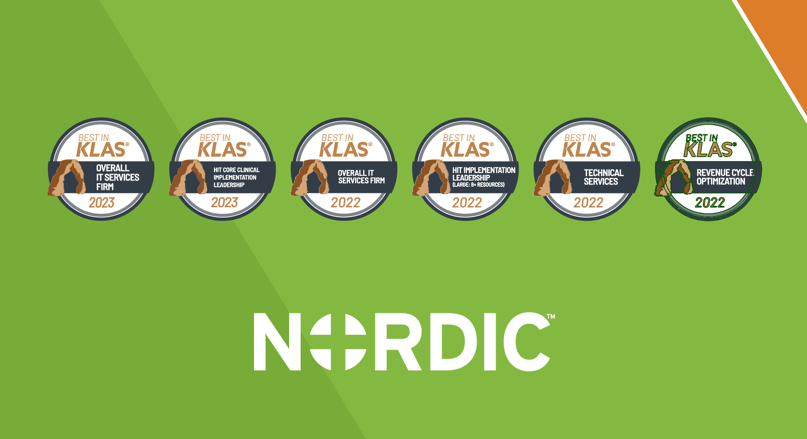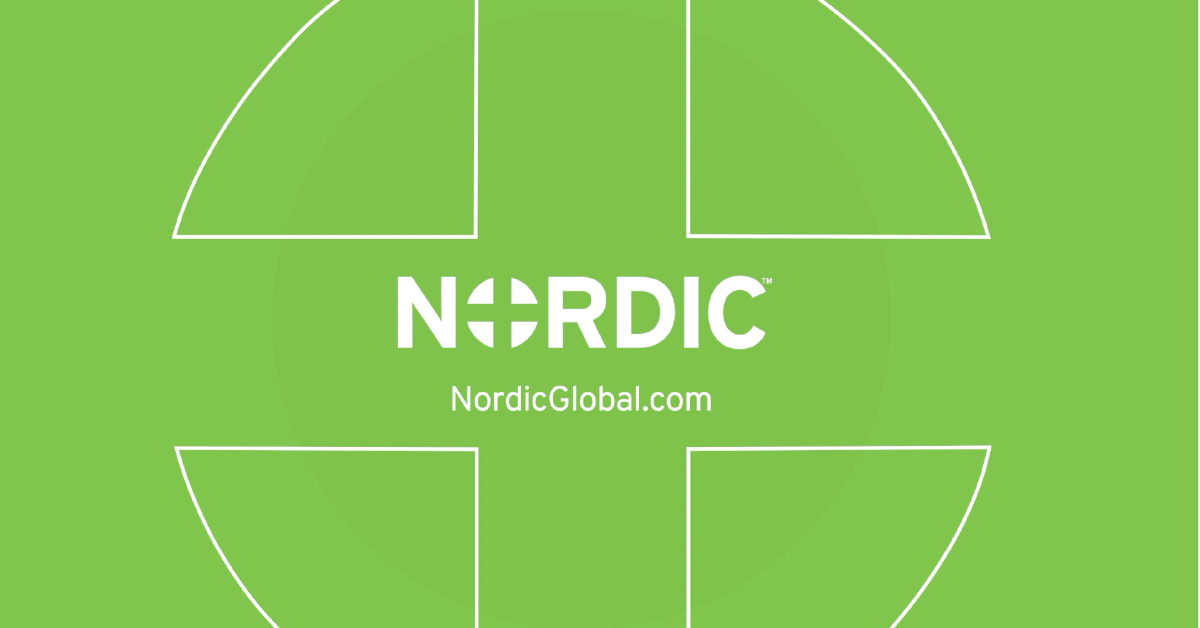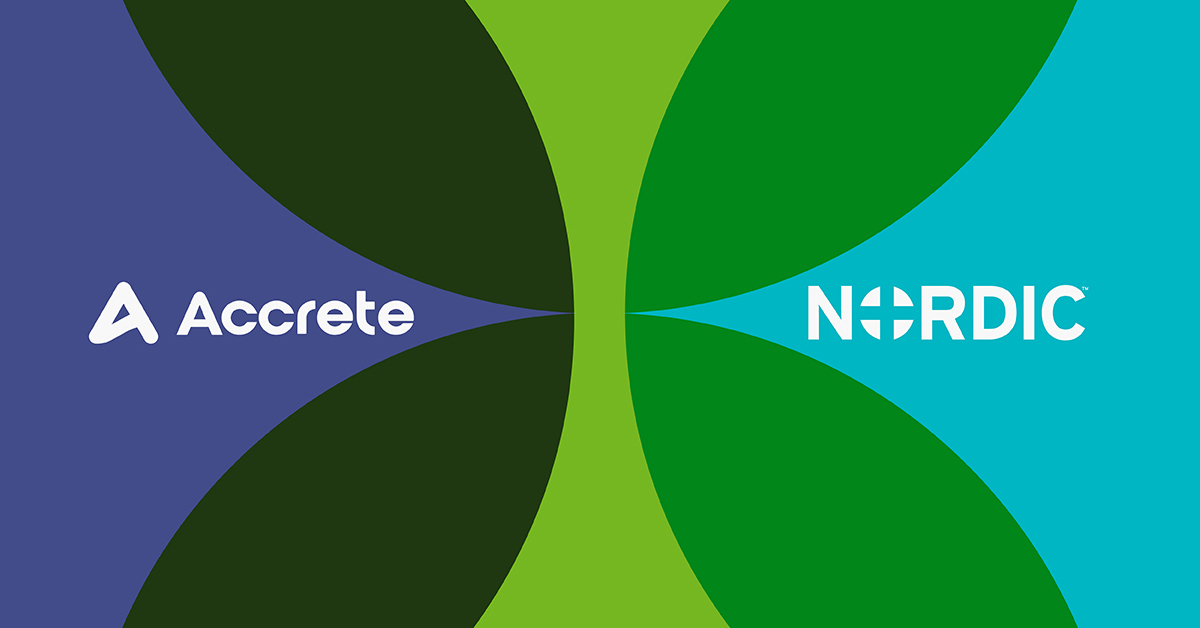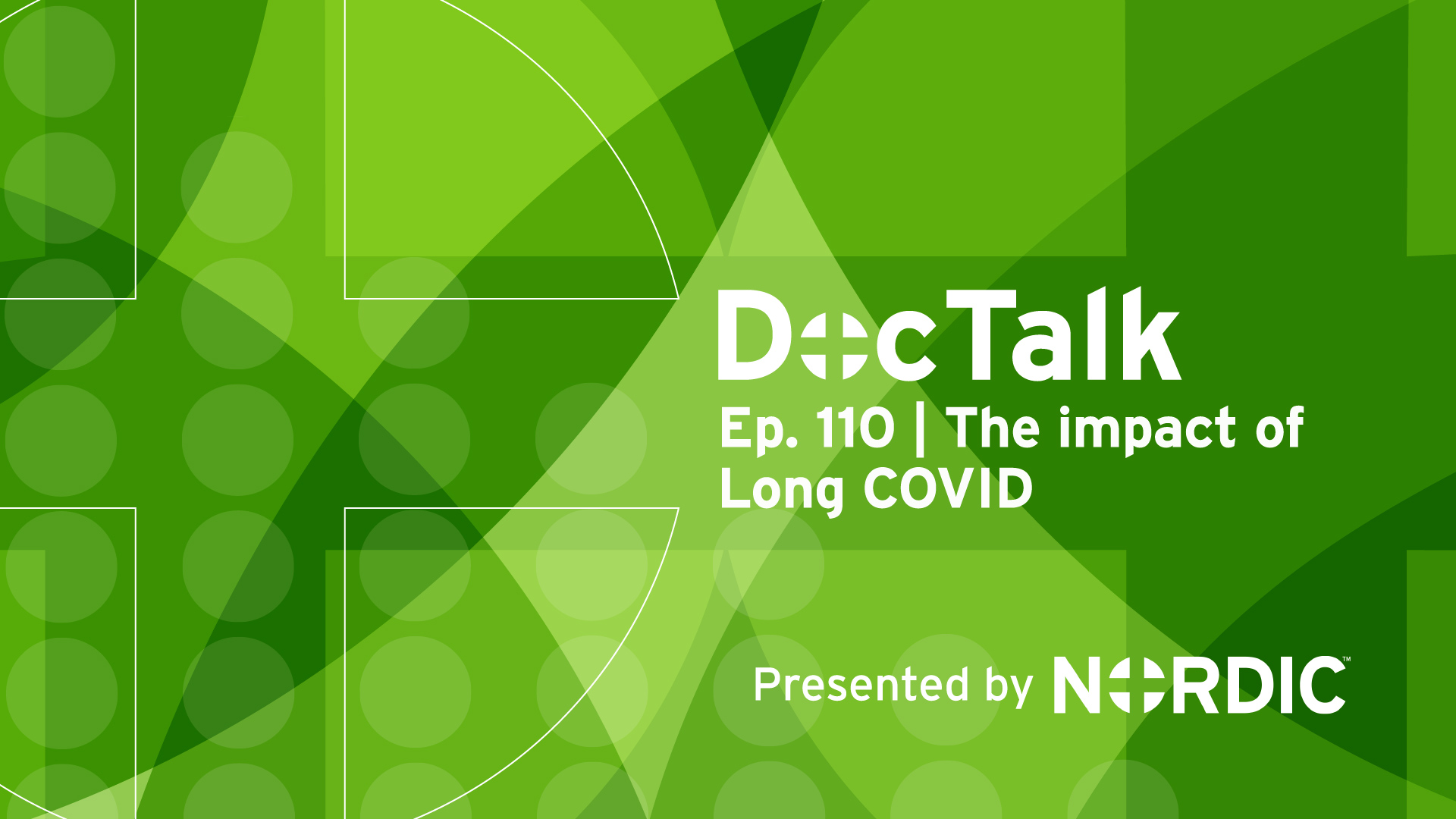If you’ve ever tried to implement a minuscule change in an office, you know that people don’t always respond well to new things. “I hate the new snacks in the break room,” you’ll hear people saying in the halls. “What was wrong with the old snacks? Why can’t we go back to those?”.jpg?width=357&name=IMG_5833%20(1).jpg)
If this is true of something small like a snack switch, it’s magnified one hundredfold when you change EHRs, upgrade your existing system, or roll out your EHR to affiliate partners. Without the right change management, you risk months of frustration and backlash while people get used to the switch.
On this podcast, Nordic Implementation Strategy Director Lindsey Manzuk, Director of Business Development Kristi Kempe, and Director of Affiliate Solutions Scott Isaacson talk best practices for effective change management around health IT transitions.
If you’d prefer to read rather than listen, the podcast transcript is below.
Show Notes
[00:37] Defining change management
[02:47] Why is change management a big deal?
[05:11] When to start thinking about change management
[07:13] Keys to a successful change management program
[09:40] Where organizations fail at health IT change management
Transcript
Lindsey: Hello. Thank you for joining us today for our discussion on change management. I'm Lindsey Manzuk. I'm the implementation strategy director here at Nordic and I am here with Kristi Kempe and Scott Isaacson. Welcome, guys.
Kristi: Hi.
Scott: Hello.
Lindsey: Would you like to tell us a little bit about yourselves?
Kristi: Absolutely. My name's Kristi Kempe. I work on our business development team here at Nordic. I have about 10 years of healthcare IT experience, and about seven and a half of those years were at Epic, where I not only helped develop change management programs, but focused a bit on operational readiness as well as doing that as an independent consultant after I left Epic and now here at Nordic.
Scott: Great. Good morning. My name is Scott Isaacson. I'm a Director of Affiliate Solutions here at Nordic. Like Kristi, I have about 10 years of experience, ranging from working at Epic, working at an Epic customer, as well as consulting here for Nordic until I joined the home office about a year and a half ago.
Lindsey: Great. So, really, a lot of experience here. Thanks. To start things off, change management, very challenging topic for organizations. I think that might be partly because it's very gray and can be defined a lot of different ways. How would you guys define change management? What do you think about when someone brings that up?
Kristi: Change management is all of the tools and requirements necessary, processes, to effectively implement change in your organization.
Scott: I think it's important to think about that. In healthcare IT, it's easy to think about the end users and think about changes there, but change management goes beyond that, even as far as the patient itself. So, in healthcare IT we need to make sure that from a change management perspective we're also thinking about that. Also, some of the things that we might implement don't affect just the healthcare IT end users. There's also patients, and quite a few other folks out in the organization will be affected as well.
Lindsey: I would also say we have a lot of experience in the EHR space, but change management principles can be applied to, really, any big change that an organization might go through, not just switching over EHRs. Why do you guys think that change management is important?
Scott: I would say the thing that I think about is that most folks are pretty resistant to change in the first place. It could be something as little as changing the color of your scrubs, but changing the way that folks actually do their day-to-day business is pretty large and pretty important. So managing that change appropriately can be important to make sure that projects are successful.
Kristi: I think a lot of times, too, it's easy to tell people how to change. I joke about that, like, "Oh, I don't change myself. I tell people how to change as part of my job." When that change impacts us, it becomes so much more real, and I think part of an effective change management strategy is helping your end users — your patients, your operations — realize that it's going to be real and have that happen sooner rather than later.
Lindsey: Yeah. A lot of times, I hear organizations say, "We already have an EHR. We're just switching to another one. It's not going to be a big deal." In my experience, at least, it still is a really big deal. Would you guys agree with that?
Kristi: It's more impactful. Switching from electronic to electronic is more impactful than switching from paper to electronic, absolutely.
Lindsey: Interesting. Scott, any specific considerations from an affiliate standpoint for change management?
Scott: Absolutely. One thing we talk about is a lot of our customers end up working with very small, one-or-two provider clinics, and an implementation is an implementation. A lot of times those smaller clinics can actually be more difficult than the larger clinics. They may be less sophisticated when it comes to technology. They have a lot of folks who wear multiple hats. Going through change management for them can be really important.
In addition, something we always have to think about is these are not owned entities. So, Kristi, to your point about telling people how to change: We don't have that power to tell them how to change. It's about empowering them, and we can't really dictate their day-to-day, so it's really working with them in a partnership.
From the affiliate standpoint, we're providing tools and some services, but they own those processes. We influence them as much as we can and hope things go well, but it’s definitely always a challenge. Also from the affiliate standpoint, we're always focused on that partnership, making sure that the organization that is extending their instance and the affiliate that’s getting that instance are working together in concert. So change management is a huge portion of that as well.
Lindsey: Great. It sounds really important, I agree. If I'm an organization about to go through a big change, when should I start thinking about this and planning for it and determining my strategy?
Kristi: Yesterday. It's never too early to start thinking about change management. I know a lot of organizations, as they undertake an implementation, everything is being thrown at them at the beginning, and so their super-user program down the road or adoption activities right before go-live are so far off in the distance. It's really important to start having those conversations early as part of your planning process.
Scott: Absolutely. We really like to set expectations early in the affiliate world to make sure that folks understand what cadence of change will be. Even if it's not the actual change of the EHR, change in terms of process and folks coming into your clinic and learning about what you do, so setting up a weekly curriculum so your affiliates actually understand what's coming on a regular basis, and they understand what they're doing this week, and they understand what they're doing next week, and they understand the importance of all of those tasks. I think yesterday is always a great place to start to make sure that our folks are well aware of what's happening.
Kristi: I think it helps, too, to take a longitudinal view of change management. You are going to have all of these resource asks throughout your install. You are going to have clinical champions. You are going to have subject matter experts at the beginning of the install. Then you are going to have super users. Then you are going to have folks that need to train their specialty counterparts. How do you build that into a program, where once a SME is done being a SME, then they're a super user? How do they take that knowledge at the beginning of the install and carry that through to go-live execution?
Lindsey: Yeah, and beyond go-live, too. How do you effectively use them post-live as you're continually changing your EHR to optimize and make things better? Great. That's a really great success point. What other things do you think are some key success components for a great change management program?
Kristi: Epic had done a great job with their readiness programs and evolving their readiness programs over the years. I was there when we got our toes wet with readiness. To see how they've morphed rev cycle readiness and clinical readiness into a program has been great. What we've done at Nordic is take some of those programs, build upon them, and help really make them applicable for operational counterparts: "Here's a great framework. This is how we can build upon it."
As we already talked about as well, the long-term planning view is something that is extremely important. I think something key to remember is, with any change, especially an EHR change, you're taking experts, you're taking people who have become familiar with a system, and you are making them novices again. They can get through their day without thinking now. Sure, you're making a computer screen change, but what are the downstream impacts and what are the feelings that they're experiencing? They're experts in their fields. They're experts in their workloads today, and all of a sudden we're starting out at level zero again. So, building that into your program from the beginning and acknowledging how people will be feeling throughout the stages of the install is something important to think about as well.
Lindsey: It definitely helps to understand some of the stress that you see right around go-live, and leading up to go-live, and right afterwards as that change is happening. I think for me, my most successful customers have made communication a huge focus and made sure that they are touching all of the corners of their organization as far as what's happening in the implementation, and that has helped them be successful from a change management standpoint.
Kristi: Lindsey, you'll hear me say this a lot too: communication and putting the right change champions in place. We'll get into that in a little more detail in a later podcast. If you do not have the right people in those change leadership roles, it makes the whole thing a lot tougher.
Lindsey: Great. All right. As far as the other side of the coin, what are some typical pitfalls that you see organizations struggle with?
Kristi: Not starting early enough, as we highlighted earlier. There really isn’t too early of a time to talk about change management. You'll see this sometimes at organizations with small changes, so process improvement changes: process improvement teams that do either unit-by-unit, clinic-by-clinic changes. I think some keys to success of those programs is making sure you have a point person in each of your units, or departments, or clinics to really own that change and really define what 'own' means. What accountability is there? What does accountability mean? What does that look like on go-live, up until go-live, and after go-live?
Scott: Yeah. To that point, I think success there is hitting each of those departments and not forgetting even one of them, because if you have one department or one user group who feels not represented, or they don't have a voice, or they don't know what's coming, that can definitely mar the success of your go-live.
Lindsey: I would also say I've seen organizations kind of forget about their night shift. Everyone's working during the day. The project team is working during the day, so their communication is with those folks that are working at the same time. Sometimes those folks that work overnight feel a little left out. So, if there are events or special communications that you can do targeted at that group, I've seen that be successful.
Kristi: As well as groups that may not touch your EHR. It's still going to be a change, and it's going to impact them whether they're logging in to your system or not. Patients are a great example of that a lot of times — again, tangential, non-necessary, clinical-based groups that wouldn't log in. I've seen that a lot at other go-lives.
Lindsey: I also think organizations really struggle to make change management a priority. You need to build the system. You need to test the system. You can't go live if your interfaces aren't set up, so it just drops to the bottom of the list, and that can cause a rush right up to go-live to try and do all of this work that you should have been doing throughout the whole implementation in just a few months, and it might not be successful.
Kristi: I think it's also important to really make sure there's the operational involvement. A lot of times someone will look at an EHR and say, "Oh, that's an IT project, right?" Obviously, we don't undersell the operational importance of that project and how much we need them involved, so really thinking about that: "Is this an IT project? Is this an operational project?" and really understanding that it's both. IT's involved in doing a lot of the heavy lifting, but from the operational standpoint, it's really important for decision-making and testing and making sure that they really understand the impact to their day-to-day business.
Lindsey: I think the last thing that I sometimes see is maybe a change overload. You're doing this EHR change and you're also trying to build a new building and move your organization. Sometimes it can just be a lot, and you need to really think about what's happening outside of your EHR implementation and how much users are getting hit from different sides as far as changes.
Scott: Yeah. From the affiliate standpoint, we often see that there are more changes, especially when it comes to mergers and acquisitions. There are instances in which you're not just changing your EHR, but you're also changing whatever your ERP system is. You're changing your lab system. You're changing the way that they do payroll. If you think about every aspect of the way that you do your business changing, I think change overload is a really good way to describe that.
Also, again, back to partnership: When it comes to affiliates, the typical change management pitfalls apply in the affiliate situation. However, oftentimes with that partnership, there can be some large repercussions if they're not handled smoothly. There are folks who may not want to take part in the merger anymore. There may be folks who pull out of the Community Connect process. The fact that these folks are now your customers and not just your employees is definitely something to think about.
They also need to feel that they have the best team working for them. This would be the affiliate in this case. You know how great your team is, but your affiliates may not know how great your team is. So they need to be reassured, and that should be part of your change management process. Then, finally, they need to feel consulted. They need to feel that they have a voice and that they have some influence in the decisions that are being made. Really, it comes down to: they understand the changes that are coming and they also understand how they can affect those changes as well, which will provide them with the most amount of buy-in.
Lindsey: Great. Sounds like a really key component to any big change. It would be a great opportunity to find an experienced partner and someone to guide an organization through that. I personally think this topic is really interesting. I've done a lot of research on it. For those of you interested in learning more, a lot of great articles out on the web. You can look up the Change Curve, the SARAH Model. John P. Kotter has done a lot of great work. Just reading, and learning, and understanding the emotional side of major changes can be really helpful when planning a big change for your organization.
Scott: I would say, from the affiliate standpoint as well, it's easy to underestimate how political affiliate projects can be, so understanding the emotional side of things also can be very, very important.
Lindsey: Great. Well, thank you. Any final thoughts before we sign off? [silence] All right. I very much appreciate your time. Thank you.







